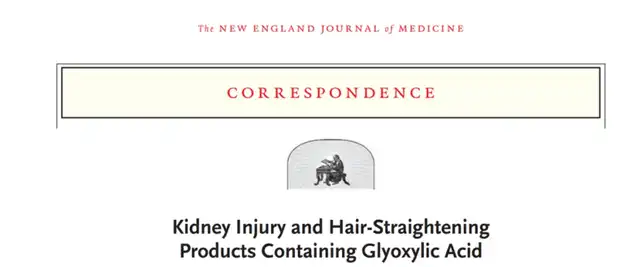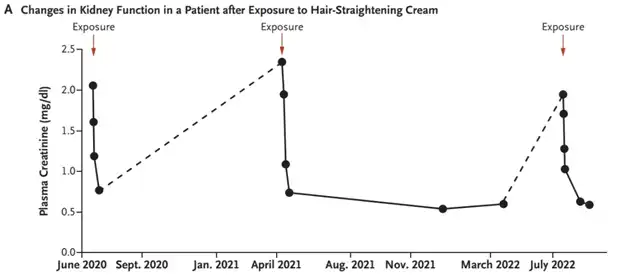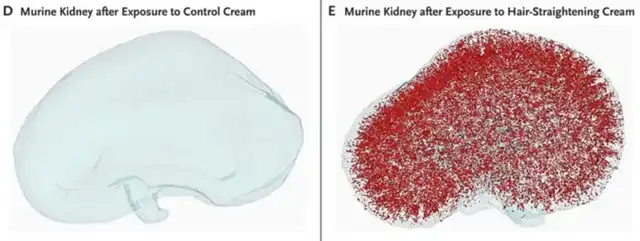Hair straightening cream led to three episodes of acute kidney injury in two years
- Normal Liver Cells Found to Promote Cancer Metastasis to the Liver
- Nearly 80% Complete Remission: Breakthrough in ADC Anti-Tumor Treatment
- Vaccination Against Common Diseases May Prevent Dementia!
- New Alzheimer’s Disease (AD) Diagnosis and Staging Criteria
- Breakthrough in Alzheimer’s Disease: New Nasal Spray Halts Cognitive Decline by Targeting Toxic Protein
- Can the Tap Water at the Paris Olympics be Drunk Directly?
Hair straightening cream led to three episodes of acute kidney injury in two years
- Should China be held legally responsible for the US’s $18 trillion COVID losses?
- CT Radiation Exposure Linked to Blood Cancer in Children and Adolescents
- FDA has mandated a top-level black box warning for all marketed CAR-T therapies
- Can people with high blood pressure eat peanuts?
- What is the difference between dopamine and dobutamine?
- How long can the patient live after heart stent surgery?
Hair straightening cream led to three episodes of acute kidney injury in two years
Research results have shown that hair straightening products containing glyoxylic acid are the cause of calcium oxalate deposition and the trigger for kidney disease. Considering the potential renal toxicity of topical glyoxylic acid, products containing this compound should be avoided, and scholars recommend their removal from the market.
“We recommend the removal of such products.” Recently, a communication article by French scholars was published in the *New England Journal of Medicine* (NEJM), directly addressing the safety issues of chemical hair straightening creams.
The article states that a young woman experienced three episodes of acute kidney injury within two years. Upon inquiry into her medical history, it was found that her illness was related to the use of a specific hair straightening product. Animal experiments confirmed that the hair straightening product contained 10% glyoxylic acid, which was the main culprit in inducing acute kidney injury.
In recent years, discussions and literature on chemical hair straightening products causing acute kidney injury have been frequent. Some people have developed acute oxalate nephropathy, requiring hospitalization and dialysis.

Three in a Row! Acute Kidney Injury on the Same Day as Hair Straightening
The aforementioned NEJM article was written by Thomas Robert and colleagues at the de la Conception Hospital in Marseille, France. According to media reports, researchers initially focused on this case because there were too many “coincidences.”
The woman, 26, had been healthy in the past. In June 2020, April 2021, and July 2022, she sought medical attention three times due to vomiting, diarrhea, fever, and back pain, and was diagnosed with acute kidney injury each time.
Laboratory tests showed elevated plasma creatinine levels. Urine tests revealed blood and white blood cells, but no proteinuria or infection. Computed tomography (CT) scans showed no signs of obstructive urinary tract disease.
Interestingly, after each illness episode, her kidney function would rapidly recover. At the last follow-up, her plasma creatinine level was normal (0.78 mg/dL). Exome sequencing analysis results were negative.
The research team reviewed her medical history and found a clue: on the day of each acute kidney injury episode, the patient had visited the same hair salon to have her hair straightened.
The patient reported feeling a burning sensation on her scalp during the hair straightening process. Medical records from the day of her visit showed that her plasma creatinine level soared to about 2.0 mg/dL.
It was later confirmed that the salon used a hair straightening cream containing 10% glyoxylic acid. This is a relatively new perm product that can harden keratin, thereby straightening the hair. In the past, the hairdressing industry had used formaldehyde or methylene glycol (which releases formaldehyde) in straightening products, but these were abandoned due to the carcinogenic risk.

A previously healthy female patient experienced acute kidney injury three times in two years, each time immediately after hair straightening. Dashed lines indicate periods without follow-up. Image source/NEJM
“Not Superstitious”
Over the past two years, there have been quite a few reports of kidney damage caused by glyoxylic acid.
On January 5, 2023, the Israeli government announced the ban of hair straightening products containing glyoxylic acid and required consumers to carefully check the ingredients when shopping online. Just the day before, the *American Journal of Kidney Diseases* (AJKD) published a study by researchers at the Hebrew University of Jerusalem in Israel, stating that hair straightening agents containing glyoxylic acid can cause acute kidney injury.
The research team tracked 26 patients with severe acute kidney injury from 14 medical centers in the country from 2019 to 2022, with an average age of 28.5 years (14-58 years). Three of them required dialysis.
One commonality among these patients was that they had just had their hair straightened before the acute kidney injury occurred. Secondly, the symptoms were similar, mainly including nausea, vomiting, and abdominal pain, with 10 people developing scalp rash. Thirdly, they had high levels of calcium oxalate in their bodies.
Among the 26 patients, seven underwent kidney biopsies, all showing signs of tubular injury. Specifically, six had calcium oxalate deposition in the renal tubules, and one had tubular microcalcification.
The study also mentioned two patients in particular. After treatment, these two individuals, not believing the association, went for hair straightening again and ended up in the hospital due to kidney injury.
The Hebrew University of Jerusalem team speculated that glyoxylic acid and its derivatives in hair straightening agents are absorbed through the skin, metabolized into oxalates in the body, and excessive oxalates deposit in the kidneys, leading to a sharp decline in kidney function.
Looking back further, in 2021 and 2022, different journals reported cases where patients developed acute kidney injury even though they had used formaldehyde-free hair straightening products. Upon checking the ingredients, it was found that they contained glyoxylic acid.
Hair dyeing is also not safe. In 2021, *BMJ Case Reports* published a case report of an 18-year-old patient with anti-glomerular basement membrane disease who experienced relief after plasma exchange, steroid pulse therapy, and cyclophosphamide treatment. She was discharged happily and dyed her hair red. However, within two weeks of discharge, her kidney disease recurred rapidly. After much consideration, doctors believed that the recurrence might be due to the use of hair dye.
Another Success Story
In previous reports on hair dyeing and kidney injury, researchers struggled to provide definitive evidence. The Hebrew University of Jerusalem team expressed in their article that the mechanism of action is still speculative.
The French scholars’ article published in NEJM this time fills in this gap.
To explore the potential mechanism, researchers conducted an animal control experiment. They applied hair straightening cream to the backs of five mice in the experimental group and petroleum jelly to the backs of five mice in the control group.
Urine tests the next day showed long, thin crystals of calcium oxalate in the urine of the experimental group, similar in shape to those observed after ethylene glycol poisoning. Twenty-eight hours after applying the hair straightening cream, the plasma creatinine levels of the experimental group mice significantly increased. Three-dimensional CT scans of the kidneys in the experimental group revealed dense deposits of calcium oxalate similar in shape to renal tubules.
None of these findings were observed in the control group mice.

A representative projection of a three-dimensional computed tomography scan model of mouse kidneys. D is the control group exposed to petroleum jelly; E is the experimental group exposed to hair straightening cream. High-density areas of calcification are shown in red. Image source/NEJM
Thomas Robert and colleagues explained that hair dye and perm products have been on the market in France since February 2013 without the need for animal experiments. “We must find a new method to test the products applied to the skin and their related toxicity. Moreover, it seems necessary to evaluate systemic absorption as well as hepatic, renal, and cardiovascular toxicity.”
The research team also stated that theoretically, not allowing hair straightening cream to contact the scalp and reducing the frequency of use can reduce renal toxicity. “Hairdressers also will advise that applying the hair straightening cream should be done about 0.5 centimeters away from the scalp. However, most people who go for hair straightening aim for a completely straight effect, which requires the cream to be applied close to the scalp.
“Our results demonstrate that hair straightening agents containing glyoxylic acid are the cause of calcium oxalate deposition and the induction of kidney disease. Considering the potential renal toxicity of topical glyoxylic acid, products containing this compound should be avoided. We recommend their removal from the market,” the researchers concluded in the NEJM article.
The findings of these studies serve as a warning to both consumers and the beauty industry about the potential risks associated with certain hair straightening products. It emphasizes the importance of carefully checking the ingredients of such products and being aware of the possible adverse effects they can have on health, particularly kidney health.
As for the woman who experienced acute kidney injury three times after using the hair straightening cream, she has since stopped using the product and has not experienced any further kidney issues. Her case serves as a cautionary tale and highlights the need for further research and regulation in the beauty industry to ensure the safety of consumers.
Hair straightening cream led to three episodes of acute kidney injury in two years
References:
1.Kidney Injury and Hair-Straightening Products Containing Glyoxylic Acid. N Engl J Med. 2024;390:1147-1149. DOI:10.1056/NEJMc2400528
2.Acute Kidney Injury and Hair-Straightening Products: A Case Series. Am J Kidney Dis. 2023 Jul;82(1):43-52.e1. doi: 10.1053/j.ajkd.2022.11.016
3.Recent use of formaldehyde-‘free’ hair straightening product and severe acute kidney injury . Clinical Kidney Journal. Volume 14, Issue 5, May 2021, Pages 1469–1471. doi.org/10.1093/ckj/sfaa272
4.Acute Kidney Injury following Exposure to Formaldehyde-Free Hair-Straightening Products. Case Rep Nephrol. Dial (2022) 12 (2): 112–116. doi.org/10.1159/000525567
5.Relapse of treated anti-GBM disease following hair dye use. BMJ Case Rep. 2021; 14(4): e240543. doi: 10.1136/bcr-2020-240543
(source:internet, reference only)
Disclaimer of medicaltrend.org
Important Note: The information provided is for informational purposes only and should not be considered as medical advice.



